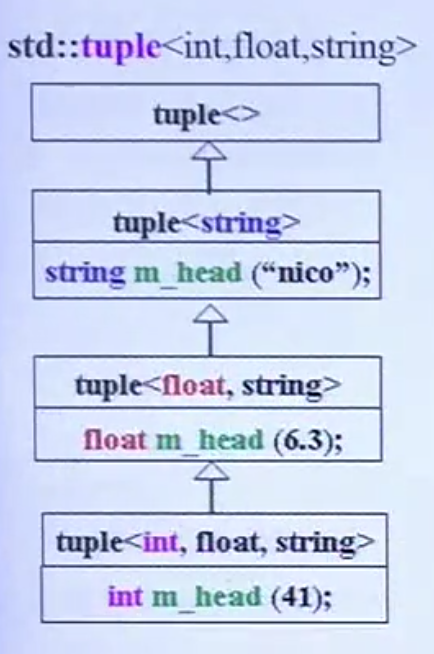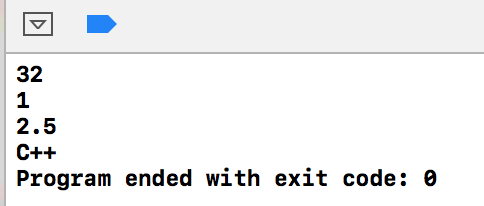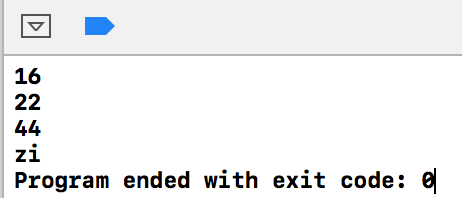版权声明:本文为博主原创文章,未经博主允许不得转载。
tuple 是一个可以装载任何变量的容器,C++11的Variadic Templates给tuple的实现带来了极大方便.
tuple的实现基于递归继承,例如
std::tuple<int, float, string> t (41,6.3,"nico");
结构图如下图

递归继承的优点是,将内存分配在连续片段上,这是在内存管理上非常好的做法
下面来介绍一下tuple的使用
std::tuple<int, float, string> t (1,2.5,"C++"); std::cout << sizeof(t) <<std::endl; //至于为啥是 32一直没弄懂 std::cout << get<0>(t) <<std::endl; std::cout << get<1>(t) <<std::endl; std::cout << get<2>(t) <<std::endl;
输出结果

sizeof(tuple) 输出tuple的参数个数
get<num>(tuple) 获取第几个元素(num)
简单的创建
//make_tuple<> auto t1 = make_tuple(22,44,"zi"); std::cout << sizeof(t1) <<std::endl; std::cout << get<0>(t1) <<std::endl; std::cout << get<1>(t1) <<std::endl; std::cout << get<2>(t1) <<std::endl;
输出结果

tuple的直接赋值
//tuple的赋值 auto t1 = make_tuple(22,44,"zi"); get<0>(t1) = get<1>(t1); //直接赋值,但是要求变量类型相同 std::cout<< get<0>(t1) << std::endl;
输出结果

tie()的使用
//tie 捆绑 a,b,c 捆绑在t1的三个值上 auto t1 = make_tuple(22,44,"zi"); int a; int b; string c; tie(a,b,c) = t1; cout << a << endl;
输出结果

重新定义
//重新定义 typedef tuple<int, float, string> TupleType;//重命名 cout << tuple_size<TupleType>::value<< endl; //输出Tuple内的元素个数 tuple_element<1, TupleType> :: type f = 10; //去tuple的第一个元素类型去声明变量 cout << f <<endl; typedef tuple_element<1, TupleType> :: type INT;//将Tuple的第一个元素的类型重新命名 INT g = 10; cout << g << endl;
输出结果

以上是C++11 tuple的基本使用
如有不正确的地方请指正
参照<<侯捷 C++新标准 C++11>>